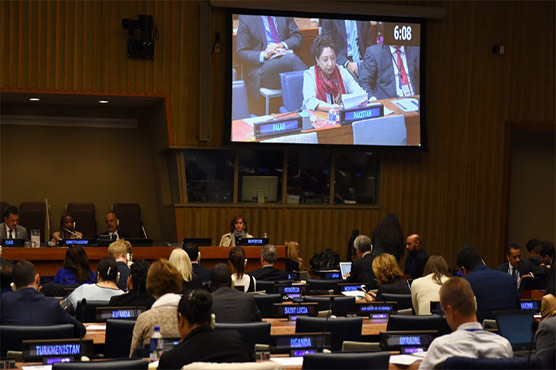17 October, 2019 Dunya News

UNITED NATIONS (Dunya News) – In a strongly-worded speech at the United Nations (UN), a senior Pakistani diplomat accused India of “hegemonic pretenses and aggressive actions”, warning that New Delhi’s conduct represents a clear and present threat to regional peace and security, especially to Pakistan, to which the bulk of its offensive capability is deployed.
Speaking in the General Assembly’s First Committee, which deals with disarmament and international security issues, Ambassador Maleeha Lodhi said that India’s “belligerent” military posture was demonstrated in February this year, when in the wake of the Pulwama incident in occupied Kashmir, it resorted to aggression against Pakistan on a completely false pretense.
“The recent unilateral action by India to further consolidate its illegal occupation of the internationally-recognized disputed territory of Jammu and Kashmir, in flagrant violation of multiple Security Council resolutions, has engendered further volatility in South Asia, posing a grave risk to regional and global peace and stability,” the Pakistani envoy told the 193-member body on Wednesday.
Ambassador Lodhi said negative global trends were pronounced in South Asia, where India unabashedly seeking to establish its dominance and hegemony through a massive build-up of its nuclear and conventional military forces and acquiring destabilizing capabilities.
These included the nuclearization of the Indian Ocean and deployment of anti-ballistic missiles (ABMs); development and testing of debris-generating Anti-Satellite (ASAT) weapons; and a constant increase in the range, sophistication and diversification of all types of delivery systems and platforms.
“Worse,” she said, “this country also uses irresponsible public rhetoric to raise the specter of war; it refuses to engage in bilateral dialogue and rejects proposals aimed at confidence-building and nuclear and missile restraint.”
“The supply of advanced military hardware and sensitive technologies from abroad is directly aiding the relentless accumulation of arms and aggressive policies of this country,” Ambassador Lodhi said.
Many supplier nations, she pointed out, sacrificed long-standing principles to grant exemptions from non-proliferation norms citing strategic and economic interests with dire with little regard for regional and international peace and security.
“Dubious concepts like ‘net-security provider’ only seem to encourage this country to accumulate military capabilities way beyond its ostensible national security needs.”
Pakistan, she told delegates from around the world, desires peace and strategic stability in order to focus on its socio-economic development and the welfare of its people.
“Our conduct continues to be defined by restraint and responsibility, and the avoidance of an arms race,” the Pakistani envoy said. “But we cannot remain oblivious to the evolving security dynamics in our immediate neighbourhood.”
“We remain open to any initiative on arms control, non-proliferation and disarmament that is equitable and results in equal and undiminished security for all States,” she said.
“We seek resolution of disputes through dialogue and diplomacy,” Ambassador Lodhi said, adding that peace and stability in South Asia was not possible without resolving the core issue of Jammu and Kashmir; without agreeing on reciprocal measures for nuclear and missile restraint; and without instituting a balance between conventional forces.
“Our proposal for a strategic restraint regime in South Asia, based on these three inter-locking elements, remains on the table,” she said.
Any meaningful progress on disarmament requires concrete steps to address regional and global challenges, the Pakistani envoy said. In this regard, she said nuclear disarmament must be pursued in a comprehensive and holistic manner, in line with the principles agreed by the first special session of the General Assembly devoted to disarmament.
Ambassador Lodhi also called for recognizing and addressing the key motivations that drive States to possess nuclear weapons, including threats from larger military forces – both nuclear and conventional; the existence of disputes with more powerful states and the failure of the UN to implement its own resolutions to resolve such disputes; the failure of the UN collective security system to deter aggression and military threats; and discrimination in the application of international norms and standards.
“These legitimate motivations are different from those States that retain nuclear weapons as a matter of prestige,” she added.
The article appeared in the Dunya News
